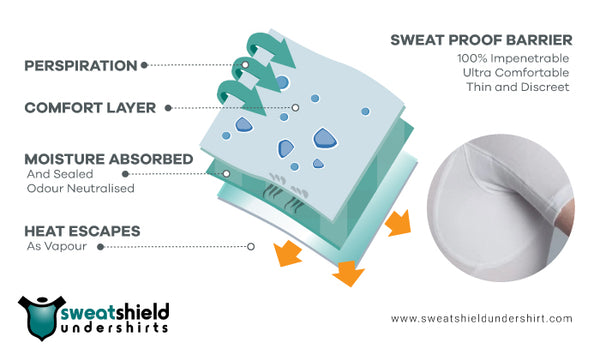Night sweating is a common problem that affects both men and women. There are numerous causes of this condition.
These range from sleeping under one too many covers or a spicy dinner to certain medical conditions.
Night sweats are also referred to as nocturnal hyperhidrosis or sleep hyperhidrosis.
For many, night sweats are nothing more than an occasional nuisance. However, excessive sweating isn't something to be ignored.
Why is this?
There is a strong link between sweating and dehydration, which can result in health complications.
People who experience night sweats are likely to find themselves, their bedding, and their nightclothes soaked upon waking.
On a personal level, it's uncomfortable to say the very least. And if you are co-sleeping, it is likely to be unpleasant for your partner and embarrassing for you.
Thankfully, there are some products available that can help with excessive sweating at night.
Rather than sleeping in a regular t-shirt, you should consider one that's sweatproof.
Sweatproof undershirts are made of breathable fabric. This means that sweat won't get trapped on your skin and soak you while you sleep.
In order to bring night sweats to an end for good, the underlying causes must be established. This will inform the appropriate treatment options for you.
What Is the Connection Between Sweat and Dehydration?
Sweating is your body’s response to high temperatures.
Body temperature is often misunderstood and ill-defined, so let’s clear this up first.
The human body has two types of body temperature.
One is called shell temperature. The "shell" area includes the:
- Skin
- Subcutaneous tissues
- Limbs
The other is referred to as core temperature. The "core" consists of contents in the:
- Skull
- Thorax
- Abdomen
Shell temperature fluctuates based on environmental factors. In contrast, core temperature remains constant.
The body has a threshold to maintain core temperature around 98.6°F (37°C). This is referred to as the thermos-neutral zone (TNZ).
It is a mechanism to cool down the body when temperatures rise beyond what's ideal.
Causes of this include:
- Certain medications
- Exercise
- Heavy or warm clothing
- Certain medical conditions
Inherently, there's nothing wrong with sweating. After all, sweating is a natural and healthy process.
Other than cooling you down, sweat also helps get rid of toxins and cleanses your pores.
But there's a problem. Excessive sweating (experienced during night sweats) can easily result in dehydration.
In turn, this causes compilations because you are losing fluid more rapidly than you are replacing it.
When dehydrated, your body cannot produce enough sweat and this has serious consequences. Particularly, this can lead to heatstroke in extreme cases.
And, lacking sufficient fluids affects normal body function, bringing about:
- Headaches
- Migraines
- Fatigue
- Weakness
- Organ failure (if dehydration goes untreated)
Most people go through stages of dehydration throughout the day if they aren’t drinking water regularly.
If you're partially dehydrated when you go to bed, it's likely that you'll sweat less. But if you're well-hydrated, chances are that you'll sweat more.
Night sweats vary in intensity for this reason.
Because of this connection between night sweats and dehydration, it's important to stay hydrated and find ways to manage the condition.
Before bed, have a bath then use an antiperspirant spray or cream. This can help reduce sweating while you sleep.
How Does Body Temperature Affect Night Sweats?
It's natural for the thermos-neutral zone to fluctuate naturally as you sleep.
Generally, most people experience cooler body temperatures that decrease through the night.
The body hits the lowest temperatures a few hours before your normal wake-up time.
Night sweats occur when your core temperature increases to the extent that you perspire while sleeping.
If this is attributed to physiological factors, then it is an indication of a medical condition. Night sweats can be ranked by order of severity as follows:
-
Mild
Sweating is noticeable, but it neither disturbs your sleep nor does it call for you to change your nightclothes.
-
Moderate
Sweating disrupts your sleep as it causes you to get up and wash your face and/or body. However, you don’t necessarily have to change your clothing.
-
Severe
Severe night sweats can deprive you of sleep. You may need to wash up and change your clothing and bedding.
What Causes Night Sweats?
As earlier mentioned, night sweats can be a sign of an underlying condition such as:
- Influenza
- Tuberculosis (TB)
- Obstructive sleep apnea
- Gastroesophageal reflux disease (GERD)
- Leukemia
- Lymphoma
- Anxiety disorders
- Hormone imbalances
- Obesity
- Cardiovascular disorders
- Hypoglycemia (low blood sugar)
- Parkinson's disease
To establish the cause of your night sweats, it's important to see a doctor if you experience several episodes within a short period.
How Can I Stay Hydrated?
Drink water based on your body weight.
Multiply your weight, in pounds, by 67% (or two thirds) to find out how many ounces of water you should be drinking.
Do you regularly engage in physical activity or work out?
Since this makes you sweat more, increase your water uptake by 12 more ounces for every 30 minutes that you are active.
When you sweat at night, drink water as soon as you get up. You may be dehydrated and this could affect the quality of your sleep.
Consume rapid hydration drinks. You're spoilt for choice with these, but watch out for their sugar and sodium levels.
If a drink contains both in high amounts, it’s not likely to hydrate you.
Reducing your fluid intake may seem like a good way to decrease the amount of sweat your body produces, but it's a bad idea and can negatively affect your health.
Try sleeping in a sweatproof undershirt instead.
What Is a Sweatproof Undershirt?
When most people come across the idea of sweatproof clothing, the one thing that comes to mind is, "how does that work?".
Materials used in making clothes have varying levels of breathability.
Breathability is a characteristic of fabric that enables heat and moisture to escape from the body. This is important for one key reason.
If heat and sweat are trapped on your skin, a pool is formed around your body, making you wet and soaking your bedding in the process.
That's why sweatproof clothing exists!
A sweatproof undershirt is designed purposefully to prevent sweat from getting trapped on the skin. This is achieved in two distinct ways.
First, sweatproof undershirts are mostly made of micro modal fabric or equally breathable fabric, such as cotton.
Cotton is highly breathable and absorbent. It can absorb as much as 25 times its weight in liquid. Now picture this: micro modal fabric is even more absorbent than cotton.
And it checks all the boxes. Micromodal is:
- Silky smooth, making it very comfortable
- Highly breathable
- Versatile, hence its use in everything from pillows to activewear
- Easily blended with other fabrics
- Eco-friendly, making it increasingly popular
Alternatively, sweatproof undershirts may have sophisticated barrier technology to keep you cool and dry.
Stay Fresh and Dry With Sweatshield
For over ten years, thousands of people have noticed a remarkable difference. All thanks to Sweatshield's range of sweatproof tees.
In particular, undershirts designed to deal with back sweating can help make night sweats more bearable.
Choosing Sweatshield Undershirts is a guarantee that you'll stay dry, fresh and comfortable all night long.
Photo: Pressfoto










